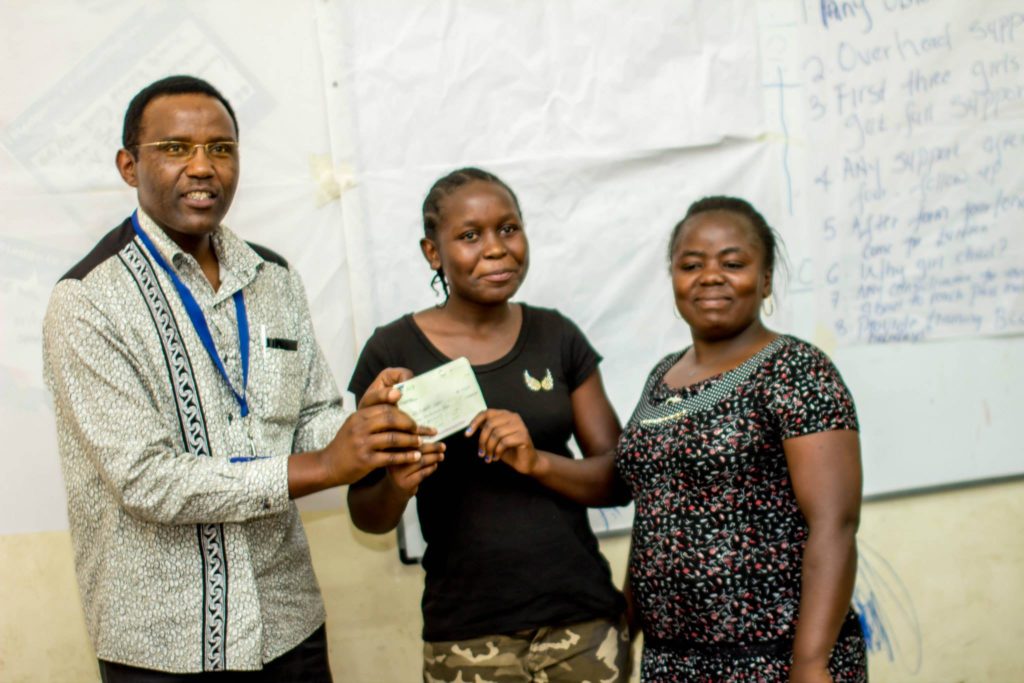Disadvantaged girls from Nairobi’s Viwandani and Korogocho informal settlement communities who participated in the ‘Improving learning outcomes and transition to secondary school’ project recorded good results in their 2013 and 2014 Kenya Certificate of Primary Education (KCPE) results. Out of 146 pupils who benefited from the project in 2013, 73 scored over 250 marks out of a possible 500; while 92 pupils out of 264 surpassed this mark in 2014.
Speaking during a parents meeting / subsidy award ceremony, APHRC’s Head of Education Research Program, Moses Ngware noted that the intervention was indeed a demonstration of how incorporating parental and community support into education can improve learning outcomes. “This project proves the positive effects of parent involvement in children’s education when they continuously support and encourage their learning and development.” He said.
These sentiments were echoed by the project’s Principal Investigator, Benta Abuya who further emphasized the project’s contribution towards eradicating poverty. “Educating girls is fundamental to development because learning and skills will enable them and their families to live happier and more productive lives. When girls have access to quality education, their potential is unleashed and cycles of poverty are broken.” She said.

APHRC’s Head of Education Research Program, Dr. Moses Ngware gives a subsidy cheque to one of the students from Viwandani
The goal of the project is to promote access and quality secondary education among girls who live in the informal urban settlements through community participation and after school support. This is done through mentorship on literacy, numeracy, life skills, counselling sessions with parents in partnership with grass-roots community based organizations in the settlements namely U-Tena and Miss Koch in Viwandani and Korogocho respectively. In an attempt to support their transition to secondary school, the students who hit the 250 mark receive subsidy awards of about USD 113 (about Kshs 10,000) each.
According to the Center for Social Sector Education and Policy Analysis (CSSEPA) Strategy and Policy Advisor, Andiwo Obondoh, educating and empowering girls from disadvantaged communities to actively shape their own future is a transformative investment. “This project is helping our girls to gain the skills they need to participate in local economic development, and will build a solid foundation for poverty reduction in Kenya.” He said. The CSSEPA representatives conducted a Monitoring Learning & Evaluation assessment on the project at Little Bells Academy; one of the school with girls benefiting from the project in 2015.

CSSEPA Strategy and Policy Advisor, Andiwo Obondoh, speaks to pupils from Little Bells Academy who are benefiting from the project
While making a presentation during the meeting on the project’s impact and challenges thus far, U-Tena project manager, Peter Mokaya called for the support of the surrounding business community. “This is a noble initiative that should involve more players so that we can touch the lives of more girls. We call upon the local business community to join us in helping these girls to achieve better results and to access quality secondary education.” He urged.
Parents whose children had received support through the project expressed their gratitude to all the partners saying that it was indeed a much needed intervention that would change the lives of their children and their communities at large.
Following feedback gathered from various stakeholders, the project now intends to scale up to include boys and to include disadvantaged girls living in other urban informal settlements across Kenya.